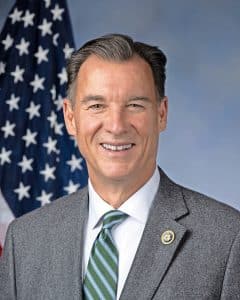
Congressman Tom Suozzi: How to let our better impulses drive American politics

August 11, 2025
Publication: America Magazine
By: Tom Suozzi
I have been in public service for more than 30 years, serving as mayor, county executive and now in my fifth term in Congress. Unsurprisingly, I’ve been attacked many times. My instinct is to punch back. That impulse isn’t just political—it’s human. When anyone gets hit, their natural inclination is to respond, and in Washington these days, that instinct dominates the culture. That is why Jesus’ instruction to “love your enemies” is one of his most difficult commands. But if we continue down the path of an “eye for an eye,” we will, as Gandhi said, “all end up blind.”
The desire to punch back is not the only human desire. St. Thomas Aquinas identifies four desires that drive human behavior: pleasure, wealth, power and honor. These desires are not inherently sinful, but St. Augustine notes that no amount of pleasure, money, influence or praise, when untethered to a higher purpose, will be ultimately satisfying. “You have made us for yourself, O Lord,” he wrote in Confessions, “and our heart is restless until it rests in you.”
Early in my career, while clerking for a federal judge, I asked another law clerk, who happened to be a Franciscan priest, about my inclination to run for office. I said, “I don’t know whether I’m going into politics because I have a big ego and want applause, or because I enjoy competition and proving I am right and others are wrong, or because I genuinely want to make the world a better place.” His advice stays with me today: “Each of these things will motivate you; it’s human. But your goal in life should be to aspire to your more noble ambitions.”
Pursuing desires can be positive when guided by moral purpose. The more power a leader gains, the more effectively they can govern. But Aquinas teaches that these desires can corrode when left unchecked. The unbridled pursuit of power and honor as ends in themselves will result in a soul-crushing cycle of selfishness and dissatisfaction.
The Founders of the United States understood this danger. They designed the three co-equal branches of government not merely on the assumption of human fallibility, but on the certainty of it. Hence, the separation of powers. James Madison argued that “ambition must be made to counteract ambition.” Our system was built not on trust in human virtue, but on knowing its limits.
Many of us fear those checks are not working in America today. We now see an executive branch with historic, insatiable overreach and a Congress too often enabling it. The very desires Aquinas feared would consume the soul now permeate public life.
The answer is certainly not to abandon democracy. Instead, we must refortify the constraints protecting us from overreach, from the endless tumult of unchecked desire for power.
Righting the ship will be difficult. I co-lead the Problem Solvers, a bipartisan group of 50 members of Congress, evenly divided between Democrats and Republicans, dedicated to finding common ground. But even here, we struggle to maintain trust in today’s divisive culture.
The first step is recognizing that loving your enemies does not mean agreeing with them. It simply means we need to stop holding them in contempt and begin to see them as potential partners, motivated by service and the common good. We must also try to understand what life experiences our colleagues bring with them. To get to know other members of Congress, I participate in bipartisan prayer breakfasts, workout classes and groups like the Problem Solvers. After a workout one morning, I was shaving next to a Republican member who mentioned his kids were off from school for the first day of deer hunting season. “Deer hunting season?” I said. “Mine get off for Rosh Hashanah.” He paused. “Rosh Ha-what?” he asked. We both laughed—and started talking.
Common ground is divine, and finding it takes listening. How can we expect to work together to get things done if so much of our lives are foreign to one another? How are we reasonably expected to resist the counterpunch if we can’t even understand?
In politics as in faith, we cannot let our instincts to punch-counterpunch or our desires for power, honor, wealth or pleasure consume us. Our natural inclinations serve us best when they are harnessed and directed toward a higher purpose. We must shine a light amid the din of division and remember that servant leadership must always be faithful to an aspiration for the common good.
Recent Articles



Redefine the Democratic Party, return to our roots

There’s Another Way to Fix Immigration

Reopen the government, stop massive health insurance hikes


